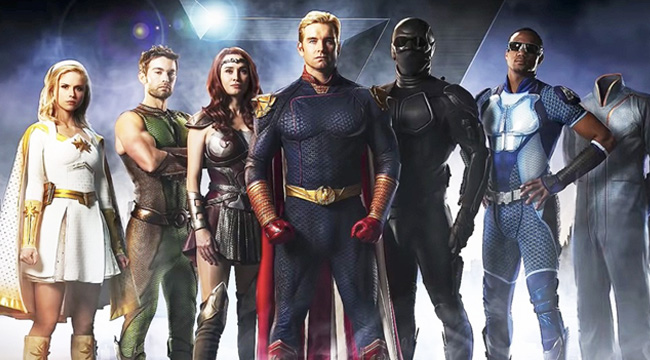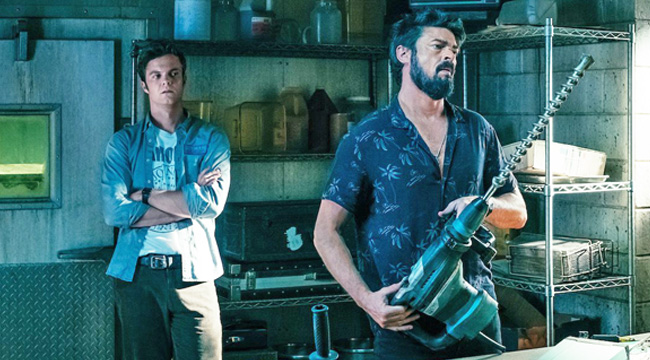
Writer Garth Ennis‘ comic book series, The Boys, launched in 2005 with an ultra-cynical look at superhero culture. That’s putting it mildly. Actually, it was super-violent, hyper-sexual, and unapologetically shocking in the same vein as Ennis’ Preacher, which was recently adapted for AMC by executive producers Seth Rogen and Evan Goldberg and is prepping for a fourth season.
Now, Eric Kripke takes on The Boys as Amazon’s series creator with Rogen and Goldberg on board again, and this must have been a challenge to bring to life. The Boys not only brings seemingly unimaginable atrocities to TV in graphic detail, but it skewers superheroes (and the society that loves them) at an eerily fitting time, not only culturally but weeks after Spider-Man: Far From Home ended the MCU Infinity Saga’s 23-movie run. Yep, this is both the best and the worst time for The Boys to arrive, which might be a fitting paradox, considering that folks are claiming superhero burnout while the box-office totals suggest otherwise.
The trickiest thing with adapting The Boys, though, isn’t necessarily timing (well, that’s a chunk of it) but tone. In Ennis’ comic, he didn’t tear down superheroes in a way that felt purposefully edgy for the sake of being edgy but in a satiric way. Yet we’re living in an era when U.S. politics resemble satire and, as a result, actual satire must strive hard to hit the mark, so viewers might feel that this show is trying a little too hard. There’s also the danger with such a self-aware project that the show could crawl up its own butt, which is never a good thing. Yet Amazon’s series manages to straddle multiple fine lines while feeling startlingly realistic, despite cartoonishly graphic violence. It’s also tackling the source material with new shades of relevance. I liked the show, quite a bit.
Let’s just put it out there, though, that this series might be, at times, uncomfortable for some to watch. Some people will be offended, and some won’t be able to stomach what materializes onscreen, given that this particular blend of sex and violence combines in nauseating ways. There’s are superhero orgies (one can gain some insight into how, exactly, Ant-Man might have sex), and in later episodes, some of the most skin-crawling sex scenes imaginable. Yet The Boys is not only dark but funny. It’s very funny, sometimes to the degree that you’ll feel bad about laughing at what you’re laughing at. It’s fine, that’s part of the process. Overall, The Boys holds a mirror up to a seemingly saturated genre, and the reflection might be pretty on the outside, but oh, the insides are ugly. This series also functions as a sweeping metaphor about power that applies to modern time, which is stunning, considering that Ennis dreamed most of this up about 15 years ago.

At its core, The Boys explores what happens when superheroes get swept up in the realms of celebrity and politics, with the bleak reality being that not everyone with this power will use it for good. These “supes,” as the show calls them, mingle with humans, and the crowning jewel of these beings is a group called The Seven, who are managed by a conglomerate (Vought Studios) with PR foremost in mind. Some supes resemble DC and Marvel characters that we know all too well, including The Deep (Chace Crawford), an Aquaman variant; Queen Maeve (Dominique McElligott) a Wonder Woman knockoff; and Homelander (Antony Starr), who’s a Captain America/Superman combo-hero. A newcomer, Starlight (Erin Moriarty), quickly grows disenchanted, and Elisabeth Shue is wonderful as the skeevy Madelyn Stillwell, who runs the joint. Together, the supes are the face of a multi-billion dollar brand of movies, theme parks and more — but oh boy, do they end up causing a lot of collateral damage.
Remember how The Avengers were blamed for destruction after the Chitauri onslaught of NYC? Well, this is so much worse, but supes’ genuine misdeeds go unchecked until vigilantes, calling themselves The Boys, take action. There’s vengeance involved, yes, and a blatant instance of the “fridging” trope, but the series is otherwise woke enough (updating some Ennis story elements) for the #MeToo era. So in addition to handling heinous crimes involving life and limb by the supes, The Boys also tackles sexual misconduct offenses while dealing with toxic masculinity and whether macho behavior is a fitting means to settle a score. Plenty of satisfying comeuppance does surface along with inner struggles, and this is a rather complex series for one that aims to be kickass.
Overall, The Boys manages to be both appealing and shocking with several actors turning in fine performances. Karl Urban oozes swagger and charisma as Billy Butcher, leader of The Boys, who goes toe-to-toe with an invisible superhero in a stellar fight scene and recruits Hughie (Jack Quaid) into the fold. Some of the supes are one-dimensional, which doesn’t really give Chase Crawford a chance to move out of Gossip Girl mode as the Aquaman knockoff, but Antony Starr manages to infuse more dimension into Homelander than his cardboard-standee characteristics deserve, and that’s for the best. Quaid is also a gem here, convincingly playing a stereotypically nerdy white guy who comes off as meek until he unleashes his greatest weapon: that smile. Somehow, he lucked out with the perfect combination of Dennis Quaid and Meg Ryan’s iconic grins, and he knows how to wield that sucker. Quaid forcefully putting on a happy face in one scene actually plays a little bit like the Joker. It’s an effect that comes full circle when one realizes that he’s attempting to shut down corrupt superheroes, who are secretly acting like supervillains.
That’s one of many little details tucked inside The Boys that will allow comic book fans to delight in The Boys, despite all the critiques of their beloved genre.
Amazon Studios’ ‘The Boys’ will stream on July 26.

